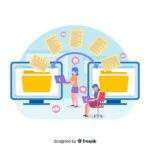
The rise of remote work has transformed the way businesses operate, offering flexibility and access to a global talent pool. However, managing and hiring remote developers comes with unique challenges related to productivity and accountability. In this article, we’ll explore effective strategies to ensure that your remote developer teams remain productive, motivated, and accountable, leading to successful project outcomes.
1. Clear Communication and Expectations
Effective communication is the foundation of successful remote team management:
- Regular Check-Ins: Schedule regular video calls or meetings to discuss project progress, address concerns, and maintain a sense of connection.
- Define Goals: Clearly define project goals, tasks, and expectations to provide a roadmap for team members to follow.
- Availability: Establish guidelines for team availability, ensuring everyone is on the same page regarding working hours and response times.
2. Set Clear Deliverables and Deadlines
Defining clear deliverables and deadlines fosters accountability and keeps projects on track:
- SMART Goals: Set Specific, Measurable, Achievable, Relevant, and Time-bound (SMART) goals for each team member to provide a clear sense of direction.
- Task Breakdown: Divide larger tasks into smaller, manageable sub-tasks with assigned deadlines, making it easier to track progress.
3. Utilize Collaboration Tools
Technology plays a crucial role in managing remote developer teams:
- Project Management Software: Use tools like Asana, Trello, or Jira to track tasks, monitor progress, and assign responsibilities.
- Communication Platforms: Employ instant messaging and video conferencing tools like Slack, Microsoft Teams, or Zoom for seamless communication.
4. Encourage Autonomy and Ownership
Empower your remote developers to take ownership of their work:
- Result-Oriented Approach: Focus on outcomes rather than micromanaging the process, allowing developers to use their creativity and expertise.
- Provide Guidelines: Offer guidelines and best practices, but allow flexibility for developers to find the most effective solutions.
5. Regular Performance Feedback
Feedback is essential for continuous improvement and maintaining accountability:
- Constructive Feedback: Provide both positive feedback and areas for improvement to help remote developers grow and excel.
- Regular Reviews: Conduct periodic performance reviews to discuss progress, address concerns, and set new goals.
6. Recognition and Motivation
Recognizing achievements and keeping motivation high is crucial:
- Celebrate Success: Acknowledge accomplishments, milestones, and successful project completions to boost team morale.
- Incentives: Offer incentives such as bonuses, additional learning opportunities, or career growth prospects for exceptional performance.
7. Transparent Documentation
Transparent documentation promotes accountability and reduces misunderstandings:
- Document Workflows: Create clear documentation for processes, workflows, and coding standards to maintain consistency.
- Knowledge Sharing: Encourage team members to share knowledge and document solutions, contributing to a collective pool of information.
8. Promote Work-Life Balance
Maintaining work-life balance is essential for sustained productivity:
- Flexible Schedules: Respect different time zones and allow for flexible work hours to accommodate personal commitments.
- Encourage Breaks: Remind team members to take regular breaks to prevent burnout and maintain focus.
9. Regular Team Building
Foster a sense of unity and camaraderie among remote team members:
- Virtual Team Events: Organize virtual team-building activities, workshops, and social events to build relationships and strengthen collaboration.
- Open Discussions: Create platforms for casual conversations and idea-sharing, helping team members connect on a personal level.
10. Continuous Learning and Development
Invest in your remote developers’ growth:
- Training Opportunities: Provide access to online courses, workshops, and resources to enhance their skills and stay updated.
- Encourage Innovation: Allocate time for personal projects or experimentation to encourage creativity and innovation.
Conclusion
Managing remote developer teams requires a tailored approach that fosters productivity, accountability, and collaboration. By prioritizing clear communication, setting realistic goals, leveraging collaboration tools, and promoting a positive work environment, you can overcome the challenges of distance and create high-performing teams. Continuous feedback, recognition, and a focus on both professional growth and work-life balance will contribute to a motivated and accountable remote developer team that delivers outstanding results.


